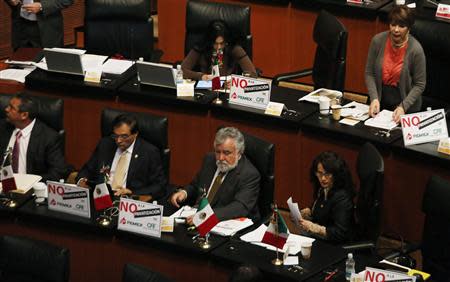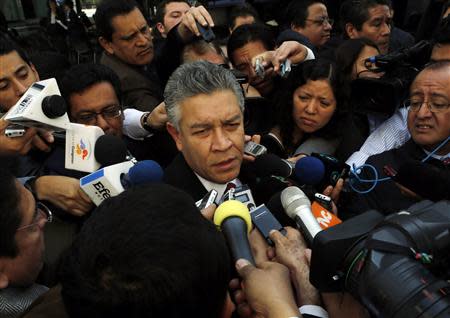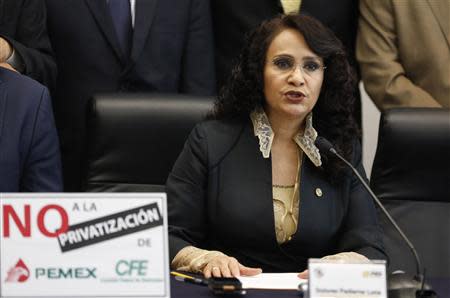Mexico Senate passes energy bill, lower house OK pending
By Miguel Gutierrez and Dave Graham MEXICO CITY (Reuters) - Mexico's Senate on Wednesday signed off on an energy bill that aims to lure private capital into the state-run oil and gas industry in the biggest shake-up since a 1938 nationalization, sending it to the lower house for debate and final approval. The reform, backed by the ruling Institutional Revolutionary Party, or PRI, and the opposition conservative National Action Party (PAN), will mark the biggest strategic shift since the world's No. 10 oil producer nationalized the sector in 1938. The overhaul is designed to entice private oil companies to either operate independently in Mexico, or partner with state oil giant Pemex through production- and profit-sharing, service contracts and licenses. Pemex's crude production has slid by a quarter since hitting a peak of 3.4 million barrels per day in 2004, and export volumes have dropped by a third over the same period. The Senate approved the bill on Wednesday morning after a marathon overnight debate. It now passes to the lower house for final approval. It was not immediately clear when lawmakers would session. As the Senate gave the bill the green light, senators from the leftist Party of the Democratic Revolution (PRD), which is fighting to stop the bill, shouted "Ask the people". PRI and PAN senators replied by punching the air to cries of "Mexico". "We have a good reform for Mexico," David Penchyna, a PRI lawmaker who heads the Senate energy committee, told Reuters after the senate vote. "Let us imagine a more productive country, with more competition, more transparency and less corruption." Outside the Senate, which is cordoned off with metal barriers, a few demonstrators shouted abuse late on Tuesday at PRI senators defending the bill who were projected onto a screen. One white poster taped to the barricades around the Senate accused lawmakers of selling out the country and likened the bill to the Spanish conquest of Mexico in the 16th century. "The Spanish came to steal the yellow gold for trinkets. The gringos are coming for the black gold ... Are you going to stay silent?" it read in messy black marker pen. SUPPORT FOR ECONOMY Lawmakers made some amendments to the draft bill on Tuesday, adding a paragraph that removes union members from the board of Pemex, a demand of the PAN, which argues that the union is a weight around the company's neck and breeds corruption. When the revised draft of the bill was presented at the weekend, the content was a positive surprise for many in the oil industry. The government hopes it will power economic growth in Mexico, which should support the credit rating and underpin the peso. The currency hit a 7-week high on Monday, but has since eased. The reform is a cornerstone of an agenda that President Enrique Pena Nieto hopes will boost growth in Latin America's No. 2 economy, which for years has lagged regional peers. It would allow private companies to operate the country's oil fields, and though it stops short of full-blown concessions, it goes much further than many analysts had expected. Lawmakers say companies will not have rights to book oil reserves on their balance sheets but will be able to report projected benefits from agreed contracts for accounting purposes, which lawyers say is tantamount to the same thing. Other specialists say the proposal is vague on this point. In a section setting out how risk-sharing contracts work internationally, the draft bill explains that production-sharing contracts let companies book crude reserves for accounting ends. But "the hydrocarbons beneath the surface are and will always be the property of the nation; in consequence, no participant in the oil industry will be able report the reserves of these products as assets," it states. CONSULTING THE PEOPLE The bill is a big departure from the service contracts now on offer, in which firms are paid a fee and can recover costs. It also goes well beyond the original proposal made by Pena Nieto in August, which was limited to profit-sharing contracts. PRD lawmakers hope to call for a binding referendum to overturn the energy bill. The lower house approved legislation on Tuesday setting out how the government has to carry out such referendums, but the measure must still pass the Senate. "This is an element of uncertainty that could impact investment decisions," said Alberto Ramos, an economist at Goldman Sachs in New York. Polls have shown a wide range of opinion on the issue. A survey published in June by the Mexico City-based CIDE university showed the 65 percent of Mexicans opposed foreign investment in the oil industry. Another poll by the newspaper Excelsior in August showed 63 percent backed Pena Nieto's plans to change the constitution to allow more private investment in the energy industry. (Additional reporting by Alexandra Alper, Michael O'Boyle and David Alire Garcia; Editing by Simon Gardner and W Simon)



